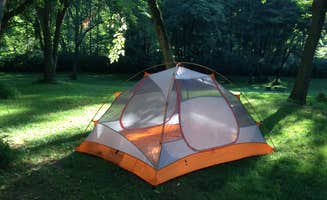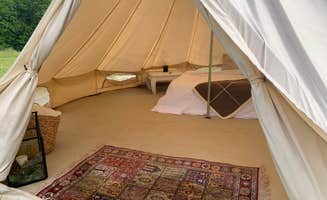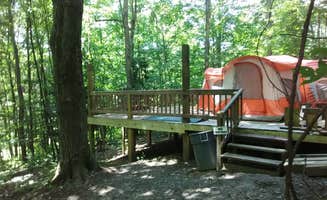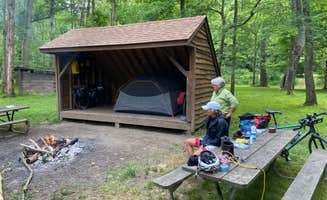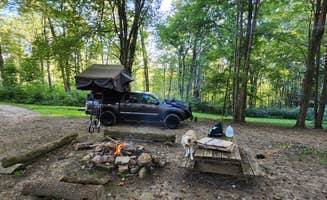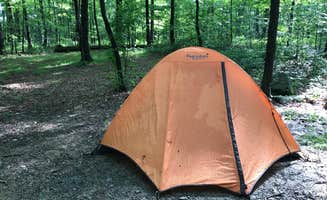Tent camping near Springdale, Pennsylvania centers on the Great Allegheny Passage Trail, with sites positioned along the Youghiogheny River at elevations ranging from 725-850 feet. The region experiences significant seasonal temperature fluctuations, with summer highs averaging 83°F and winter lows reaching 19°F. Most campsites remain open from April through October, with rainfall averaging 3-4 inches monthly during peak camping season.
What to do
Cycling day trips: Bikers staying at The GAP Trail Campground - Bikers Only can access nearby towns for supplies and dining. "Town is a short walk away, with a few restaurants and other options for necessities as well," notes reviewer Shari G.
Historical exploration: Visit the cemetery near Dravo's Landing Campground for a glimpse into local history. One camper mentioned, "It's close to an old cemetery which is useful in telling ghosts stories around the campfire."
Mountain biking: Head to Mountain View Camps for access to dedicated trails. Reviewer Richard C. recommends to "Hit the mountain bike track, explore the ruins on the game lands, and might even see an albino fawn."
Fishing access: Several camps provide river access for fishing opportunities. Sites along the Youghiogheny River offer shoreline fishing spots within walking distance of tent sites. Many GAP Trail campsites feature direct river access via short trails.
What campers like
Clean facilities: Campers frequently mention the maintained appearance of sites. At The GAP Trail Campground, a reviewer describes, "Everything is clean as a whistle…pun intended. Here's where that luxury kicks in, so much that you'll wonder if what you're doing still qualifies as camping."
Shelters during rain: The Adirondack-style shelters at several sites provide protection during inclement weather. A camper at Round Bottom appreciated this feature: "We secured the only open Adirondack Shelter and were able to set up our tent inside, along with keeping our bicycles inside and out of the elements."
Group accommodation: Sites accommodate various group sizes without feeling crowded. Sarah Q. notes about Dravo's Landing: "We camped out overnight with a group of 14 people, and there was plenty of room for everyone to pitch their tents and spend a relaxing night under the stars."
River access: The proximity to the Youghiogheny River provides cooling options after hot days on the trail. A reviewer at Roundbottom Hiker-Biker Campground mentioned, "The river is very easy to access for a quick dip after a long day on the trail."
What you should know
Water sources: Many campgrounds have unreliable water sources requiring filtration or advance planning. At Roundbottom Hiker-Biker Campground, "the well for the campground stated that it was no longer potable. My guess is that this is simply because the volunteer organization which maintains this campground lacks the funds for testing."
Train noise: Railroad tracks parallel many camping areas, creating noise disturbances. Multiple reviewers mention train noise, particularly at night. Consider bringing quality earplugs for overnight stays.
Wildlife considerations: Take precautions with food storage, especially against raccoons. As Sarah Q. warns, "Just be sure to secure your food overnight - if you don't, the raccoons will make quick work of it!"
Busy periods: Sites experience higher usage on weekends and during fall foliage season. Reviewers note campgrounds are "sparsely filled or empty" midweek but can fill quickly on weekends, especially at sites with limited shelters.
Tips for camping with families
Shelter selection: Arrive early to secure lean-to shelters when camping with children. These structures provide more stability and protection from weather. Sites with lean-tos are limited and first-come, first-served.
Mealtime considerations: Multiple picnic tables at Laurel Ridge State Park Campground facilitate family dining. Bring all necessary cooking equipment as facilities are minimal. Brian S. notes that "camping areas are supposed to have firewood and water, but the wood is often punky, and the water needs to be treated."
Wildlife viewing: Morning and evening hours provide opportunities to spot local wildlife. One camper reported, "I've heard a barred owl at night both times I camped here."
Educational opportunities: Use camping trips to teach children about environmental stewardship. Most sites operate on "pack-it-in-pack-it-out" principles, making them excellent learning opportunities about minimizing impact.
Tips from RVers
Site leveling: RV campers should prepare for uneven terrain. A camper at Indian Creek Camplands noted, "Not the most level areas but good clean and quiet campsites."
Access limitations: Many tent camping areas near Springdale can only be reached by foot or bicycle, limiting RV access. Sites that do allow RVs typically have minimal amenities without typical hookups.
Alternative accommodations: For those seeking more comfort, some properties offer cabin options alongside tent sites. The GAP Trail Campground provides enhanced amenities that one reviewer described as "the perfect hybrid" between camping and glamping.


